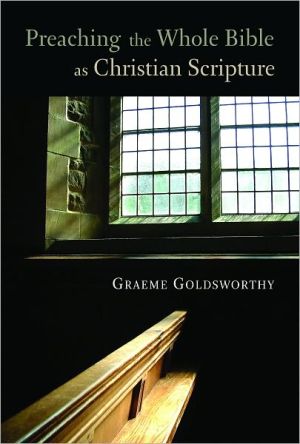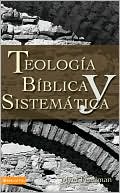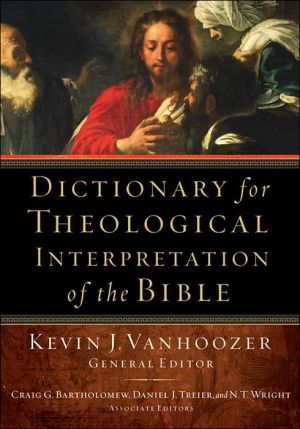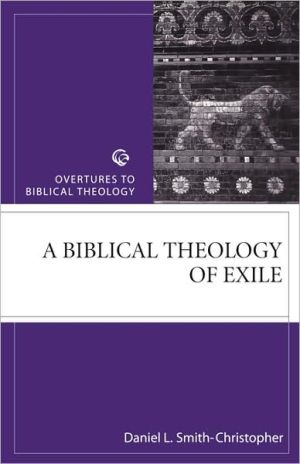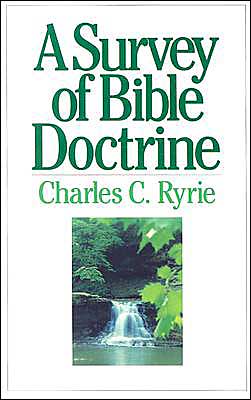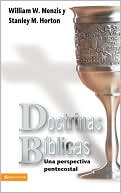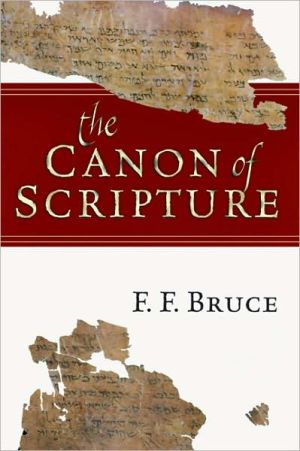Preaching the Whole Bible as Christian Scripture: The Application of Biblical Theology to Expository Preaching
While strong, gospel-centered preaching abounds, many Christian pastors and lay preachers find it difficult to preach meaningfully from the Old Testament. This practical handbook offers help. Graeme Goldsworthy teaches the basics of preaching the whole Bible in a consistently Christ-centered way.\ Goldsworthy first examines the Bible, biblical theology, and preaching and shows how they relate in the preparation of Christ-centered sermons. He then applies the biblical-theological method to the...
Search in google:
While strong, gospel-centered preaching abounds, many Christian pastors and lay preachers findit difficult to preach meaningfully from the Old Testament. This practical handbook offers help. Graeme Goldsworthy teaches the basics of preaching the whole Bible in a consistently Christ-centered way. Goldsworthy first examines the Bible, biblical theology, and preaching and shows how they relate in the preparation of Christ-centered sermons. He then applies the biblical-theological method to the various types of literature found in the Bible, drawing out their contributions to expository preaching focused on the person and work of Christ. Clear, complete, and immediately applicable, this volume will become a fundamental text for teachers, pastors, and students preparing for ministry. Sidney Greidanus A solid contribution to the challenge of preaching Christ from the Old Testament.
Jesus and the Koala (from pages xi-xv)\ \ The Predictable "Jesus Bit"\ There is a story told about an Australian Sunday School teacher who felt that her approach to teaching was in need of some remedial action. She thought she was altogether too predictable and the children were becoming bored with her story-telling and questioning of the class about what they had learned. She decided on a new tack to try to rectify matters. The next Sunday, once the preliminaries were over, she stood before the class of five-year-olds and asked, "Who can tell me what is gray and furry and lives in a Gum tree ?" The children were completely taken by surprise by this totally unexpected and new approach. They thought there must be a catch and stared blankly at the teacher. "Come on," she coaxed, "someone must know. What is gray, furry, lives in a Gum tree—has a black leathery nose and beady eyes?" Still no answer. "Oh, surely you know." She was nonplussed by this reticence. "It lives in a Gum tree; eats Gum leaves; it has big beady eyes and furry ears." Silence. She was about to switch tactics and to go on to something else when a small girl gradually raised her hand in the air with much hesitation. Delighted, the teacher asked, "Yes, Suzie?" The child replied, "I know it's Jesus, but it sounds like a Koala!"\ Such predictability is, hopefully, a bit of a caricature. Yet, at a more sophisticated level it can exist. Some of the students that I teach at Moore Theological College discussed their concerns with me about listening to preachers who deal with the Old Testament in such a way that the students were moved to think, in the course of the sermon, "Ho hum! now here comes the Jesus bit." These preachers were attempting to avoid an exposition of the Old Testament without Christ, which so often leads to a moralizing approach. Obviously a preacher needs to have a clear sense of the relationship of Old Testament texts to the person and work of Jesus, but that preacher also needs to be able to communicate this relationship in ways that avoid such stereotyping. It is also obvious that something is very wrong if the preacher's way of relating the text to Jesus is felt to be boring and predictable.\ Problems with the Old Testament\ My original intention was to deal with the thorny subject of preaching from the Old Testament. There is no doubt in my mind, and clearly in the minds of many, that preaching from the Old Testament presents many problems for the Christian preacher. Having taught Old Testament for a number of years in two theological colleges and a Bible college, I have found that people expect me to be both motivated and experienced in preaching from the Old Testament. Yet, in all the years I have spent in full-time pastoral ministry, I have found a need to be very disciplined in planning a preaching program to include the Old Testament on a regular basis. It is plainly easier as a Christian to preach from the New Testament than from the Old. Some may feel that preaching from the Old Testament is the same in principle as preaching from the New. Of course, if we are diligent in the choice of our texts, that may well appear to be the case. But even at the level of ethical teaching in the prophets, or the praise of God in the Psalms, we instinctively recognize that the material still emanates from the period before Jesus came into the world. How much more, then, is the gap obvious when we deal with some ceremonial prescriptions in the law of Moses.\ The Separation of the Testaments\ However, other considerations lead me to take up a more general approach to preaching and biblical theology. The first of these is that the separation of biblical studies and biblical theology into the two specialized areas of Old Testament and New Testament, however necessary at the formal and academic level, has led to an extremely costly separation of the Testaments. There are obvious distinctions between the Testaments that make such separation seem logical and even necessary. But the Christian Church has received one canon of Scripture and has always recognized both the distinctions between the Testaments and their essential unity. This particular problem has many expressions, but we need note only two. First, in academic curricula established in theological and Bible colleges the division between the Testaments tends to be fairly rigidly maintained. This has repercussions for the way pastors preach and teach, and for the kind of role models they create for their lay preachers and teachers. Furthermore, while the study of the New Testament will inevitably raise questions of the use of the Old Testament in the New, the study of the Old Testament is easily carried on in total isolation from the questions of how this significant body of literature should function as Christian Scripture. Second, in the field of theological writing we notice two major characteristics of literature related to the concern of this study. Biblical theologies are almost entirely either theologies of the Old Testament or theologies of the New Testament. Very few writers have attempted to write a theology of the Bible. In addition, commentaries on the Old Testament rarely take up the question of the Christian significance of the Old Testament text. Even some series of Old Testament commentaries emanating from evangelical publishers tend to be very coy about raising the questions about how the texts can be related to the concerns that might figure in a Sunday sermon. Perhaps it could be said with some justification that the question of Christian application is not the concern of commentaries. Unfortunately it does not appear to be the concern of any other major body of literature either.\ Problems with the New Testament\ There is another related problem that affects the way we deal with the New Testament, a problem that also exists for the preacher of texts from both Testaments. Its specifics may differ because of the distinctions between the two Testaments, but the nature of the problem is the same: What is the relationship of this text to the person and work of Jesus of Nazareth? Let me be a little more specific. Preachers with a concern for expository preaching are predisposed to developing a preaching program in which a series of expositions from one particular book is given. In my experience the preaching of a series of sermons, say, from an epistle, easily leads the preacher to fragmentation because, while the epistle was written as a single letter to be read at one time, it is often divided up so that it is dealt with in Sunday sermons over a period of several weeks. There is nothing wrong with that as such, provided we recognize the changed dynamics. Thus, Paul may expound the gospel in the first part of the letter, and then go on to spell out some ethical and pastoral implications. When the preacher finally gets to deal with the latter, it is possibly a couple of weeks or more since the gospel exposition has happened, and the connection between the gospel and behavior, very closely related in the epistle, can be lost. The result is that the exhortations and commands are no longer seen to arise out of the good news of God's grace in the gospel but as simple imperatives of Christian behavior; as naked law.\ The relationship between what is and what ought to be, that is, the relationship between the finished work of Christ and the task of the believers, is often well flagged in the text. Paul, for example, frequently indicates the relationship by using the word "therefore" or a similar indicator of consequence. If we were to preach a series on Philippians, an obvious unit for one sermon would be the servant passage in Philippians 2:1-11 in which the saving work of Christ for us is clearly expounded. The following Sunday might feature the next part of the chapter, say vv. 12-18. How easy it is to ignore the "therefore" and to see the injunctions and exhortations of this passage as standing alone and not, as Paul expounds them, as the implications of the grace of God in Christ. A regular attender who is fairly well informed may make the connection. But a newcomer, or someone who missed the previous Sunday, could gain the impression that the essence of Christianity is a matter of keeping the rules.\ There are also broader questions of the relationship of the modern Christian to the contents of the ancient text. Does a saying of Jesus, for example, the Sermon on the Mount, have enduring significance as a direct word to Christians today? What are the interpretative matters that face us in the four Gospels, which relate a situation that no longer exists, namely, Jesus' presence in the flesh? Or again, in what way can the narrative material in Acts be the norm for the life of the modern church? A description of an event involving the apostles or the primitive church does not necessary stand as the pattern for all time. We recognize the existence of elements of discontinuity between us and the Old Testament, but we do not so readily recognize those that exist between us and the New Testament.\ Every One Is an Interpreter: Every One Should Be a Biblical Theologian\ These are some of the issues that the preacher faces, like it or not. They can not be avoided on the grounds of a simplistic assertion about the clarity of Scripture. The preacher is an interpreter of Scripture, as is every Christian who reads the Bible and seeks to make sense of its application to our daily lives. There are some basic principles that stem from the nature of the Bible that we need to be clear about. We also recognize that our assessment of the nature of the Bible involves certain basic assumptions or presuppositions that should be owned. It is vital for us to remember that our reference point is Jesus of Nazareth as he is testified to by Holy Scripture. The apostolic testimony to him shapes our approach to the Bible as a whole. This testimony necessitates the self-conscious formation of a biblical-theological approach to the unity and diversity of the Bible.\ In this study, I approach the subject with certain presuppositions that were initially shaped by my conversion as a teenager under an evangelical ministry, and by my theological training at Moore Theological College. Graduate theological studies at the University of Cambridge and at Union Theological Seminary in Virginia forced me to examine carefully my presuppositions and my reasons for holding to them. Some of my earlier assumptions have undergone a measure of modification as I have gained what I think is a better grasp of the overall message of the Bible. Notwithstanding the need to mature, I have, for better or worse, come to the conviction that the position of traditional historical Christianity is the most consistent. My position is one of reformed and evangelical theology. On this basis I seek to establish my biblical theology as a primary hermeneutic tool for understanding the significance of the biblical text and as a vital expository tool for preaching. While I think it important to make clear my own presuppositions, I do not thereby imply that the matters raised in this book are relevant only to those who agree in every detail with my presuppositions. It is my hope that any preacher or teacher who wants to expound the Scriptures as the word of God will find encouragement in these pages for that most noble task.
Introduction: Jesus and the KoalaNothing but Christ and Him Crucified Part 1: Basic Questions We Ask about Preaching and the Bible What Is the Bible? What Is Biblical Theology? What Is Preaching? Was Jesus a Biblical Theologian? What Kind of Unity Does the Bible Have? How Does the Gospel Function in the Bible? What Is the Structure of Biblical Revelation? Can I Preach a Christian Sermon without Mentioning Jesus? Part 2: The Practical Application of Biblical Theology to Preaching Introduction to Part 2: Christ in All the Scriptures Preaching from Old Testament Historical Narrative Texts Preaching from Old Testament Law Preaching from the Old Testament Prophets Preaching from the Wisdom Literature Preaching from the Psalms Preaching from Apocalyptic Texts Preaching from the Gospels Preaching from Acts and the Epistles Preaching Biblical Theology
\ Sidney GreidanusA solid contribution to the challenge of preaching Christ from the Old Testament.\ \
